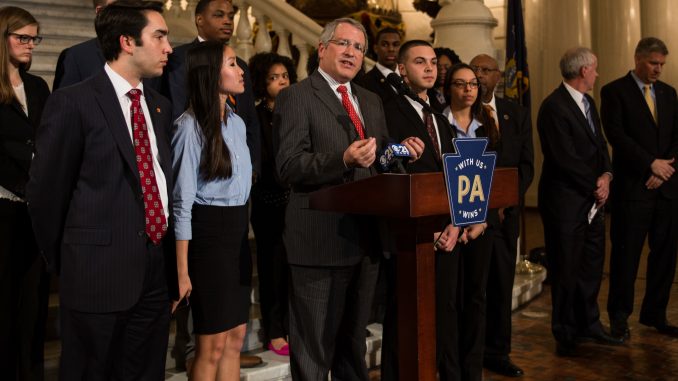
Temple’s operational budget proposal for the 2017 fiscal year has been sent to Harrisburg, but some school officials again expect difficulties along the way.
CFO and Treasurer Ken Kaiser said in a phone interview it’s “almost a preconceived notion” for him the budget won’t be passed by the deadline. But he added that he expects the delay to be much shorter this time.
The legislature passed the 2015-16 fiscal budget March 23, but there are less than three months to push for the next one, due June 30. July 1 is the beginning of the 2016-17 fiscal year.
Partisan issues dictated the latest budget delay. Gov. Tom Wolf did not sign the budget—saying that the math in it “didn’t work”—but let it go into law after the longest budget impasse in state history.
Kaiser said the budget impasse could help make the upcoming budget appropriation easier. He added progress may have been made on the broader issues as 2016 and 2017’s budgets were worked on concurrently once the delay dragged into the new year.
Temple is asking for a 17.3 percent increase in funding, from $147.4 million to $172.9 million. Although it is a steep increase, Kaiser said Temple isn’t overshooting. It’s part of a two-year plan where Wolf would fully restore the funding that former governor Tom Corbett cut years ago.
In 2011, Corbett reduced funding to Temple by $32 million. Temple has been at a fixed rate of $139.9 million for the last four years. In the past three years, Temple has had to make $113 million in budget reductions.
In response to the budget cuts, Temple introduced a decentralized budget model in 2012, which allows individual schools and colleges to decide how to use their operating budgets independently.
Another reason for a decentralized budget is to shift the school’s focus from more state funding to increased internal revenue. The revenue would come from tuition, indirect cost recovery, a percentage of state appropriations and other direct revenue like gifts, sales and fees.
Last year’s budget only saw a 5 percent increase, but Kaiser said he is still happy about it.

“I’m pleased we got a 5 percent increase. It means Pennsylvania understands the need for public higher education,” he said. “We look to be a partner with the commonwealth to provide what’s best for the state.”
Temple is expecting institutional increases all across the board in 2016-17 including tuition, state medical assistance, undergraduate and graduate student enrollment and employed professors. The budget request predicts 26,914 undergraduates, 3,661 graduate students and 1,838 professors.
To try to ensure funding, Temple put more money into lobbying.
According to the Center for Responsive Politics, Temple spent $280,000 on services from lobbying firms like Holland and Knight and Roscommon International in 2015. Kaiser said the lobbying goes toward places like Washington, D.C. to gain research dollars as well as to receive more appropriations from Harrisburg.
According to President Theobald’s introduction of the budget proposal, every $1 appropriated to Temple generates $43 in state impact.
Dominic Barone can be reached at dominic.barone@temple.edu.


Be the first to comment